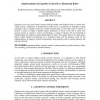Free Online Productivity Tools
i2Speak
i2Symbol
i2OCR
iTex2Img
iWeb2Print
iWeb2Shot
i2Type
iPdf2Split
iPdf2Merge
i2Bopomofo
i2Arabic
i2Style
i2Image
i2PDF
iLatex2Rtf
Sci2ools
111
click to vote
IJHR
2008
2008
Implementation of Cognitive Control for a Humanoid Robot
Engineers have long used control systems utilizing models and feedback loops to control realworld systems. Limitations of model-based control led to a generation of intelligent control techniques such as adaptive and fuzzy control. Human brain, on the other hand, is known to process a variety of inputs in parallel, ignore distractions to focus on the task in hand. This process, known as cognitive control in psychology, is unique to humans. We are interested in implementing such cognitive control functionality in robots. This paper outlines the multi-agentbased, hybrid cognitive architecture for a humanoid robot and the progress made on the implementation of cognitive control functionalities using attention, affect, working memory and internal rehearsal.
Related Content
| Added | 12 Dec 2010 |
| Updated | 12 Dec 2010 |
| Type | Journal |
| Year | 2008 |
| Where | IJHR |
| Authors | Kazuhiko Kawamura, Stephen M. Gordon, Palis Ratanaswasd, Erdem Erdemir, Joseph F. Hall |
Comments (0)

